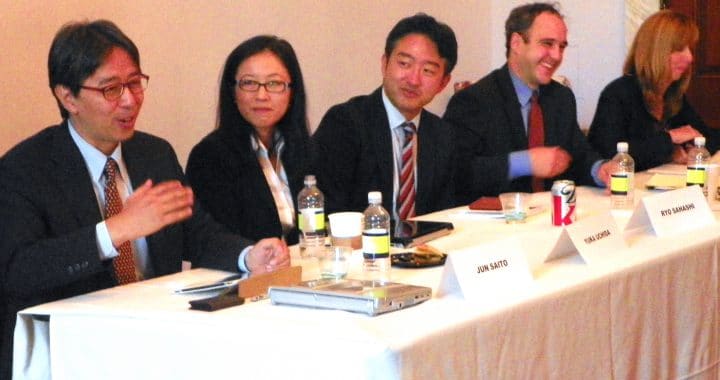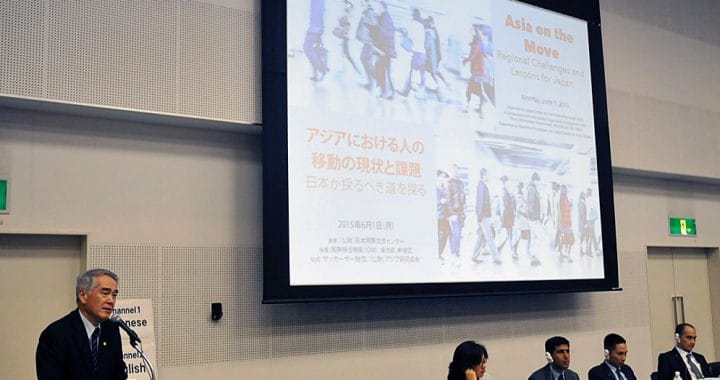The Vacuum of Political Leadership in Japan and its Future Trajectory | Congressional Staff Seminar

As part of a JCIE research project on Japanese political leadership, on September 25, 2012, JCIE and the US Association of Former Members of Congress’s Japan Study Group co-hosted a panel discussion for US Congressional staffers and others on the frequent turmoil that has characterized Japanese politics in recent years and made it difficult for Japanese prime ministers to project strong leadership.
The Role of Philanthropy in Postwar US-Japan Relations | International House Workshop

A second workshop was held on November 19, 2002, at the International House in Tokyo, Japan. Forty participants gathered at the daylong meeting to discuss the experiences of Japanese grantees in their dealings with American foundations as well as the role of US philanthropy in helping rebuild intellectual ties between Japan and the United States.
The Role of Philanthropy in Postwar US-Japan Relations | 2003 Tokyo Workshop

A fourth workshop was held on July 12–13, 2003, at JCIE’s offices in Tokyo. The project team gathered to discuss the drafts and outlines of the results of their research on the various aspects of philanthropic involvement in the US-Japan relationship during the period of 1945–1975. The discussions focused on strategies for the final phase of archival research, interviews, and writing.
The Role of Philanthropy in Postwar US-Japan Relations | 2003 Cambridge Workshop

On March 8-9, 2003, a small group of experts gathered for a third workshop in Cambridge, Massachusetts, to focus on the role of US philanthropy in promoting Japanese studies in the United States and American studies in Japan.
The Role of Philanthropy in Postwar US-Japan Relations | 2002 Pocantico Workshop

On the weekend of October 12–13, 2002, JCIE held a workshop outside New York City at the Pocantico Conference Center of the Rockefeller Brothers Fund. The 23 participants, a number of whom were active in US-Japan philanthropy during the period of the study, shared their views regarding the motivations of grantmakers, the influence of the cold war and anticommunist sentiment on Japan-related grantmaking, the relationship between the government and foundations, and the impact of American philanthropy on Japan’s intellectual community and the US-Japan relationship.
Symposium on Universal Coverage in the 21st Century: Redefining Japan’s Health System

In partnership with renowned international medical journal, the Lancet, and the Asahi Shimbun, one of Japan’s leading newspapers, JCIE organized an international symposium on September 1, 2010, to explore the issue of universal coverage in aging societies like Japan, and to discuss preliminary findings of analysis on Japan’s health system.
Strengthening Nongovernmental Contributions to Regional Security Cooperation | Jakarta Roundtable

On August 4, 2010, the Japan Center for International Exchange (JCIE) and the Centre for Strategic and International Studies co-sponsored a roundtable in Jakarta as part of JCIE’s study of “Nongovernmental Contributions to Regional Security Cooperation.”
Symposium | Asia on the Move—Regional Challenges & Lessons for Japan

On June 1, 2015, JCIE held a symposium in Tokyo to share the findings of a multinational case study project on The Movement of People in East Asia and the Role of Civil Society.
Strengthening Nongovernmental Contributions to Regional Security Cooperation | Tokyo Workshop

On January 18–19, 2010, the participants gathered in Tokyo for a workshop to discuss initial findings of a project examining (1) the roles of civil society in enhancing regional security cooperation, (2) common features of the roles of civil society beyond the issue areas, and (3) key factors for successes of civil society activities contributing to regional security cooperation.
Strategic Assistance: Disaster Relief and Asia-Pacific Stability | Workshop III

The third workshop provided the project research team the opportunity to engage with key constituencies within the US., Japanese, and international HA/DR communities, present tentative recommendations designed to enhance US-Japan cooperation and coordination on HA/DR, and move toward operationalizing the Strategic Assistance concept.
